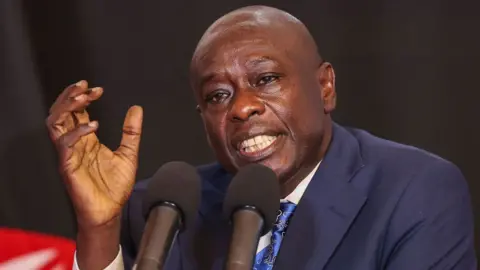Kenya’s parliament has initiated the final phase to remove Deputy President Rigathi Gachagua from office.
Last week, a large majority in the National Assembly voted in favor of his impeachment, paving the way for a two-day trial in the Senate that will determine whether he will be ousted.
Gachagua is facing 11 charges, including corruption, inciting ethnic tensions, and undermining the government, all of which he denies.
This situation stems from his recent falling out with President William Ruto, who has remained silent on the issue.
The Senate trial is taking place before the entire chamber after plans to establish an 11-member committee to investigate the charges were dropped.
The deputy president appeared before the Senate, where the charges were formally presented to him. He pleaded not guilty to each count as the trial began.
Political analysts anticipate that the impeachment will be upheld, as ruling party senators are expected to be supported by opposition lawmakers, similar to how the National Assembly voted in favor of the case.
Later on Wednesday, the National Assembly’s evidence against Gachagua, along with any witnesses, will be presented and examined for three hours, followed by two hours allocated for cross-examination.
The trial will resume on Thursday, focusing on Gachagua’s evidence and witnesses, and is expected to continue into the late afternoon.
Once the proceedings conclude in the evening, senators will engage in a two-hour debate on the motion before casting their vote, which is set for Thursday night at 20:30 local time.
The Senate has the option to extend the process into Friday, which is the legal deadline for concluding the matter.
For Gachagua to be removed from office, at least two-thirds of the 67 Senate members must vote in favor of the motion.
If the vote results in his impeachment, Gachagua would be permanently barred from holding public office.
He is likely to challenge the impeachment in court if it passes.
Despite numerous attempts to halt the process, Gachagua has been unsuccessful, having filed at least 26 court cases so far.
A judge ruled on Tuesday that the court would not interfere, allowing the Senate to proceed with its constitutional duties.
Just before Wednesday’s proceedings began, a three-judge bench also rejected a similar request.
One of the key allegations in Gachagua’s impeachment is that he amassed assets worth 5.2 billion Kenyan shillings ($40 million; £31 million) over two years, allegedly through corrupt practices.
He has argued, including during his trial in the National Assembly, that much of the property in question came from his late brother’s estate.
The deputy president, a wealthy businessman from central Kenya’s politically influential Mount Kenya region, has seen a rapid rise.
In just five years, he went from being a first-term MP to becoming Kenya’s deputy president after being chosen as William Ruto’s running mate in the August 2022 election.
At the time of his selection, he was already facing corruption charges in court, which were later dropped after he assumed the role of deputy president.
Gachagua’s impeachment trial has dominated national discourse and media coverage in recent weeks.
Many view the intense political drama surrounding the trial as diverting attention from the economic hardships facing ordinary Kenyans, particularly the high cost of living.
In June, widespread protests erupted over unpopular tax increases, leading to deadly clashes that exposed a growing rift between Ruto and Gachagua.
Gachagua is now accused of undermining security agencies after making remarks during the protests, in which he blamed the intelligence agency.

